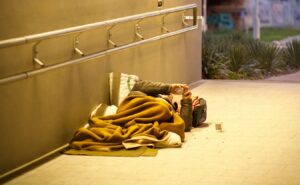 Can Do Places solves the twin problems of town centres by helping local groups turn empty buildings into collaborative work spaces. Founder Iain Scott talked to New Start about putting passion and creativity at the heart of economic development.
Can Do Places solves the twin problems of town centres by helping local groups turn empty buildings into collaborative work spaces. Founder Iain Scott talked to New Start about putting passion and creativity at the heart of economic development.
—————————————————-
On 1950s solutions for 21st century problems
Can Do Places started with a rant. The Scottish Government had published a review of town centres, which was very broad and good. One retailer responded to it by suggesting that the solution to the growing numbers of vacant shops in town centres lay in cheaper rates and easier parking. They were coming up with solutions from the 1950s at a time when people were using town centres in very different ways and had very different needs from them.
On the rise of the self-employed and micro-businesses
At a time when one in seven people are working for themselves and more than a third of Scottish home-based businesses plan to grow, we need buildings in our town centres where people can come together and work collaboratively. At Can Do Places we help community organisations to realise the challenge of taking on a local empty building and turning it into a co-working space for local self-employed people.
On the power of small
People say to us “oh this is a small-scale solution”, or, “these people are running lifestyle businesses”. I say to that “many a mickle maks a muckle”, which translates as “lots of small things add up to something big”. Ten small businesses turning over £50k a year equates to £2m in the local economy. I’m fed up of regeneration people saying we need something that will make a big impact. We are working on the counter-argument to the idea that big glossy projects that will solve everything. This is people working together – not in serviced offices – but in collaborative co-working spaces. You have plumbers talking to programmers and out of those collaborations comes new energy and creativity. This is about building a collaborative and innovative economy
On passion as the driver of the local economy
In Crieff we’ve been working with a group of local people to help them understand and navigate the obstacles involved in taking over an empty building. For them, passion is the driver of the economy. They love their place and don’t want it to be run down. We give peer support rather than working directly with groups, to help them through the obstacles and keep their enthusiasm levels high. Support is often siloed off and groups need to work to the criteria of funders and often get awash in a sea of bureaucracy.
On creating an enterprising place
I’ve written a booklet as an inspirational guide to help people navigate their way though. The advice I would give to people wanting to create an enterprising place is, firstly, to be confident. There is a massive market for collaborative workspaces and they should know that they have the skills and imagination to turn a building into something with a beating heart. They need to think differently, learn from others and build their allies.
On districts of creativity
A big part of this is about changing the narrative. When councils hear that community groups want to revive a building they are often patronising towards them, but these spaces can have huge long-term impact. People are running global digital businesses from their kitchen tables but that’s not recognized by economic development people. I’m talking in Eindhoven in the Netherlands this week at an event about creative communities. In Eindhoven an old Phillips factory and former industrial park has been turned into a cultural and creative district, called Strijp-s with homes, co-working spaces and event spaces. Why can’t every town in Scotland have something like that?

















Leave a Reply